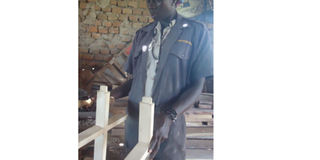Female carpenter proves doubting Thomases wrong

Ritah Adwe at her workshop in Akisim ward, Soroti Town recently. The carpenter hopes she can inspire more women to pursue any job they want. PHOTO BY SANDRA BABIRYE
It is 1pm and Ritah Adwe is at her workshop in Akisim ward, Soroti Town. She pauses for a while on seeing me thinking I am one of her morning customers, but suddenly remembers I’m the journalist she had agreed to meet with the previous day.
Her workshop is one of the renowned furniture centres in Soroti Town, but little did I know that all the furniture there was a work of her hands until a close friend bought furniture from her.
Adwe has been a carpenter since 2000. Sixteen years on, she does not regret the decision. She completed her O-Level from Ngora High School in 1996.
Adwe’s father died at a young age leaving her mother to raise her and her siblings single-handedly. She is the eldest of her siblings.
“My decision to pursue carpentry and joinery at Uganda Martyrs Vocational Institute, Soroti was met with criticism by some relatives who saw it as unworthy of a girl,” she says. “But the interesting bit about carpentry is that there will always be market for the products,” she says as justification of her choice.
After completing her certificate course, Adwe first worked at other people’s workshops while pursuing a Diploma in Carpentry and Joinery at St Kizito Madera Vocational Institute.
Self-discovery
Using her earnings, Adwe started to acquire tools in preparation for self-employment and by 2005, that dream became a reality. From the few tools she had and startup capital from her mother, Adwe started her own workshop at Akisim Housing Estate, where she has managed to attract and retain customers.
At the workshop, Adwe makes furniture ranging from kitchen cabins, office, home and institutional furniture, which can be got for as low as Shs40,000 to as high as Shs1.5 million.
Miss Carpenter, as she is fondly referred to, says she values quality at her workshop and assumes it is what attracts clients to her. She has over time acquired four more people to help with the growing workload.
No room for laziness
Carpentry requires hard work, dedication and commitment, especially the times when orders get overwhelming.
This is especially when one has to balance institutional orders with private clients demands. “Like other occupations, one has to balance between leisure and work. In most cases, we have had to forego leisure when work accumulates,” Adwe says.
Thanks to carpentry, Adwe says she has been able to buy the plot of land where her workshop sits today so that she does not have to rent anymore.
Finding fulfilment
“I derive even more happiness than a salary would bring me at the end of the month. I can pay wages, support my mother and the needy children under her care,” she says.
Regardless of the monetary value realised in her carpentry business, Adwe says her ability to stay afloat as a female carpenter is her lifetime achievement.
“I hope I can be an inspiration to other women out there to take up this job that is male-dominated,” she adds.
Challenges
But Adwe has to grapple with challenges of her trade, especially poor quality timber that affects the quality of furniture they supply to the market.
“We always have to be alert to find and use only the timber worth the value and reputation of our business standards,” the carpenter says.
Power outages also put work at a standstill thus delaying their money in the process.
Despite these challenges, Adwe is looking forward to expanding her business by investing more capital into machinery that can curve timber into any shape.




